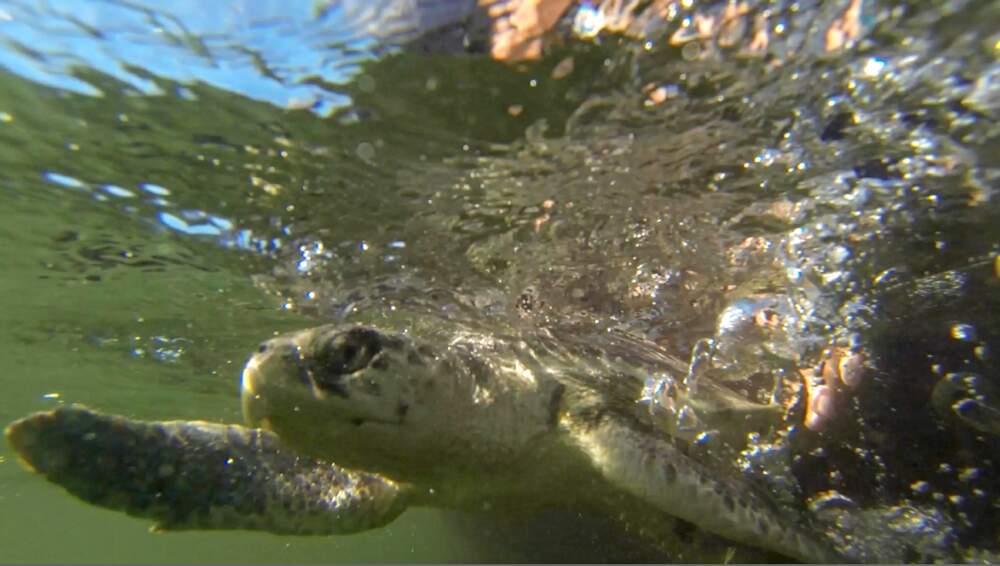Advertisement
What to do when you spot a lost, distressed or beached sea turtle

When you see a sea turtle in trouble, what should you do?
In the summer, several species of sea turtle migrate into the Atlantic waters along New England. But due to quickly warming water temperatures in the Gulf of Maine and the somewhat complicated geography of Cape Cod Bay, experts are seeing turtles stay in the area into the fall — creating a dangerous situation as temperatures drop.
"We see an increase in 'cold stun' strandings," said NOAA stranding and disentanglement coordinator Kate Sampson. That's when a turtle, too cold in its environment, beaches itself to die. Scientists expect to see an increase in these kinds of strandings.
A leatherback, loggerhead, green or Kemp’s ridley sea turtle quietly swimming along is likely safe and healthy. But if you spot one that appears to be distressed, out of place, tangled or dying, there are steps you can take to help it.
The Sea Turtle Disentanglement Network (STDN), established by NOAA, is a trained group of volunteers acting as first responders to a sea turtle in crisis. Here are a few suggestions Sampson, who oversees the network, shared with WBUR on what to do when you come across a turtle in a risky situation.
If a turtle is beached
A sea turtle on the beach is likely stranded, which can happen for a variety of reasons, says Sampson. “Some of them are natural, they could be diseased or something like that. But unfortunately, a lot of them are the result of human interaction,” Sampson added. That's everything from getting tangled in fishing gear to being hit by a boat. The STDN asks you to report any sea turtles you see on the beach to the Northeast Marine Mammal and Sea Turtle hotline, which can be reached at 866-755-6622.
Remember: do not try to move the turtle. Sea turtles are very strong, and a stressed animal can act unpredictably. Some turtles, like leatherbacks, can weigh over 1,000 pounds. Without a proper understanding of the animal’s health situation, touching a beached turtle could put you and the sea turtle at risk, Sampson explained.
If a turtle is distressed, dying or tangled in the water
A day out on the ocean can be made even better by catching a glimpse of a sea turtle swimming in the water. If you’re on a boat and happen to spot a sea turtle that appears distressed, dead or tangled in fishing equipment, the STDN asks that you call the hotline or call the Coast Guard on Channel 16 if you don't have service.
Turtles keep a low profile in the water, and don’t come up above the surface much. And, there are instances where “boaters are being very responsible, looking ahead of them and still don’t see a turtle,” said Sampson. She suggests wearing polarized sunglasses and keeping an eye out for jellyfish — a leatherback sea turtle’s preferred meal — as a few ways boaters can avoid striking a turtle.
Stand by until help arrives
On your boat or on land, keep a safe distance from the turtle after making your call, and do not attempt to disentangle or move the animal yourself. Be sure to stay on the scene: STDN responders have an easier time locating the turtle when they have help from the person who found it.
“Most often, an animal on shore will already be dead,” said Sampson. “But we do have live turtles that wash up sometimes that are sick or injured. Those can be rescued off the beach and taken to a rehabilitation facility to get the medical care they need.”
Even if the animal can’t be saved, the STDN and NOAA still need information on why the animal died. All of the local sea turtle species are endangered or threatened, and knowing one cause of death can help the STDN rescue others.

